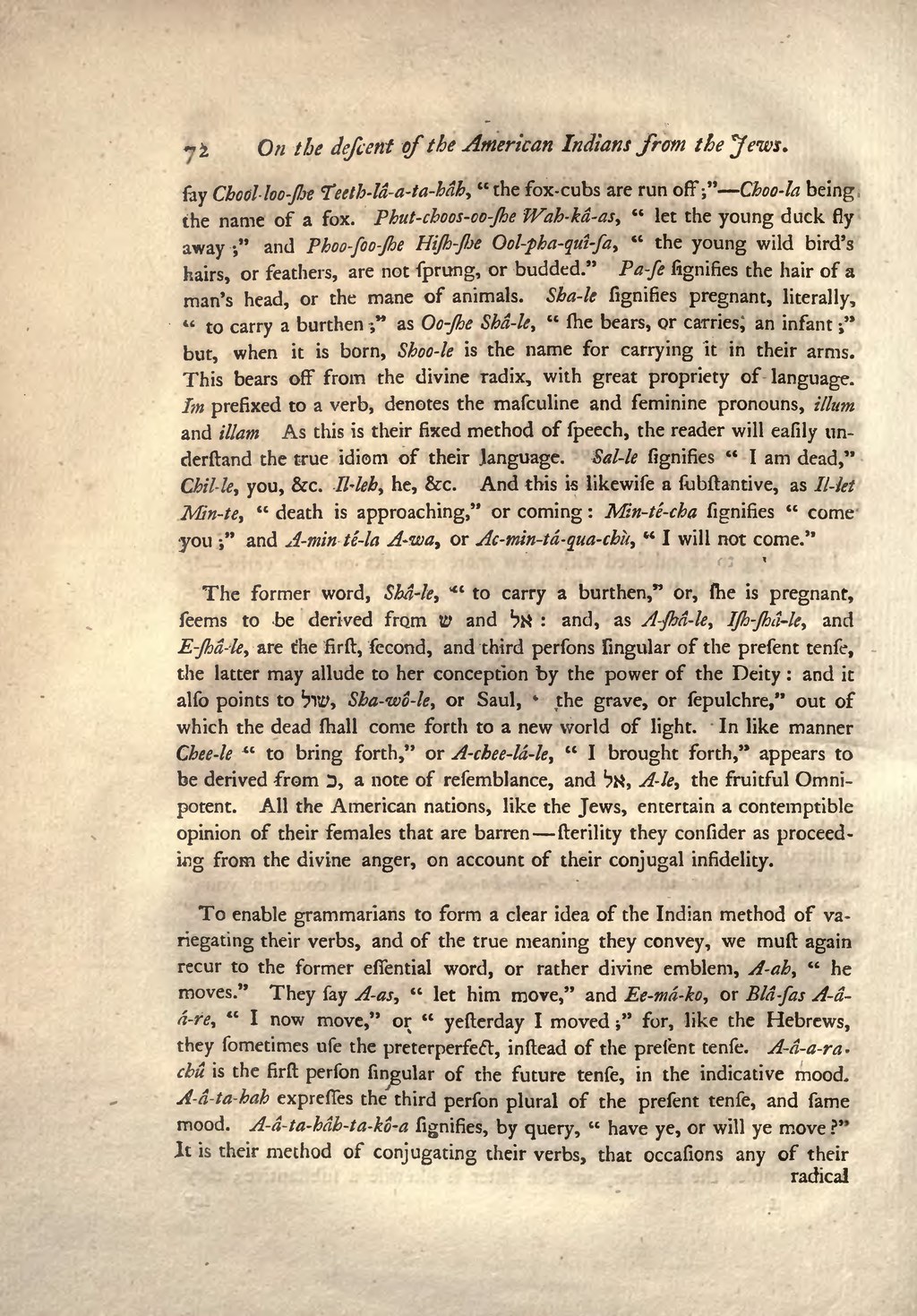- i On the defcent of the American Indians from the y
lay CbooI-loo-Jbt Teeth-ld-a-ta-hdh^ "the fox-cubs are run off;" Choo-la being the name of a fox. Phut-cboos-oo-Jhe Wah-kd-as, " let the young duck fly away ;" and Phoo-foo-Jhe Hijh-foe Ool-pba-qut-fa, " the young wild bird's hairs, or feathers, are not fpnrng, or budded." Pa-fe fignifies the hair of a man's head, or the mane of animals. Sha-k fignifies pregnant, literally, " to carry a burthen -," as Oo-Jhe Sba-le, " flic bears, or carries; an infant -" but, when it is born, Sboo-Ie is the name for carrying it in their arms. This bears off from the divine radix, with great propriety of language. Im prefixed to a verb, denotes the mafculine and feminine pronouns, ilium and illam As this is their fixed method of fpeech, the reader will eafily nn- derftand the true idiom of their language. Sal-le fignifies " I am dead," Cbil-te, you, &c. fl-leb, he, &c. And this is likewife a fubftantive, as Il-ht Min-te> " death is approaching," or coming : Min-te-cha fignifies " come 1 you ;" and A-mln te-la A~wa> or Ac-min-td-qua-cbit, " I will not come."
The former word, Sba-le 9 "" to carry a burthen," or, me is pregnant, feems to -be derived from v and *?** : and, as A~fha-le, IJh-jhii~le t and E-Jha- ; le, are the firft, fecond, and third perfons fingular of the prefent tenfe, the latter may allude to her conception by the power of the Deity : and it alfo points to Vv#, Sba-wo-le, or Saul, * the grave, or fepulchre," out of which the dead mail come forth to a new world of light. In like manner Cbee-le " to bring forth," or A-chee-ld-le, " I brought forth," appears to be derived from D, a note of refemblance, and ^N, A-le^ the fruitful Omni potent. All the American nations, like the Jews, entertain a contemptible opinion of their females that are barren fterility they confider as proceed ing from the divine anger, on account of their conjugal infidelity.
To enable grammarians to form a clear idea of the Indian method of va riegating their verbs, and of the true meaning they convey, we muft again recur to the former efiential word, or rather divine emblem, A-ah, " he moves." They fay A~as^ " let him move," and Ee-md-ko^ or Bid-fas A-d- a-re, " I now move," or " yefterday I moved j" for, like the Hebrews, they fometimes ufe the preterperfe<fl, inftead of the prefent tenfe. A-a-a-ra* cbu is the firft perfon fingular of the future tenfe, in the indicative mood. A-d-ta-hah exprefTes the' third perfon plural of the prefent tenfe, and fame mood. A-d-ta-bdh-ta-ko-a fignifies, by query, " have ye, or will ye move ?" It is their method of conjugating their verbs, that occafions any of their
radical
�� �
